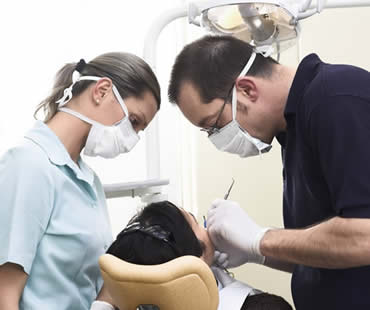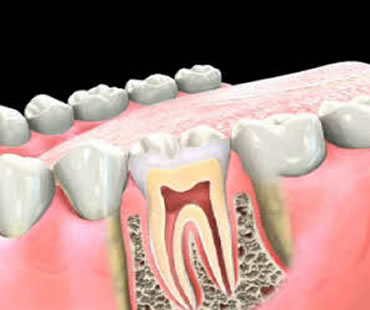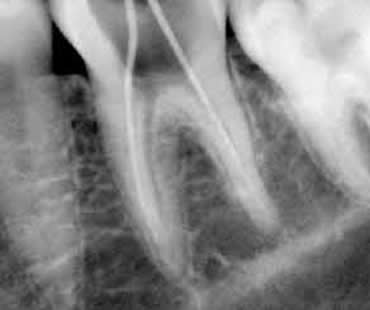
Each year, more than 30,000 Americans receive an oral cancer diagnosis. Unfortunately, less than 57 percent will live beyond five years. In fact, the death rate for oral cancer is higher than cervical cancer, Hodgkin’s disease, brain cancer, and liver cancer. Usually seen in older patients, oral cancer in individuals under 40 is on the rise.
Fast Facts about Oral Cancer
• Early detection increases the survival rate to almost 90 percent.
• Initially, oral cancer patients may have few obvious symptoms of the illness.
• Certain factors, such as gender, lifestyle choices, and age can increase your risk of developing oral cancer. An estimated 25 percent of oral cancer patients, however, have no risk factors for the disease.
• Famous people who have battled oral cancer include Michael Douglas, Roger Ebert, Aaron Spelling, Humphrey Bogart, Eddie Van Halen, and Babe Ruth.
• Signs of oral cancer include a sore that does not heal after two weeks, color change in oral tissue, hoarse or scratchy throat, and difficulty with chewing or swallowing.
• Side effects of oral cancer may include chronic discomfort, loss of oral function, and difficulty in chewing, swallowing, or speaking.
• Research suggests that a diet rich in fruits and vegetables decreases your chances of developing cancerous lesions.
• Routine dental visits allow your dentist to look for signs of oral cancer, which can lead to early detection if there is a problem.
• Tobacco and alcohol use can result in a 75 percent chance of receiving an oral cancer diagnosis.
We treat patients from Toronto and the surrounding area

An estimated 50 million Americans have lost all their teeth, and 69 percent of adults are missing at least one tooth. Without a full set of teeth, you may deal with alignment problems, dietary restrictions, and self-esteem issues. With modern dentures, your dentist can renew your appearance and improve oral health.
Dentures are prosthetic appliances created to replace missing teeth. Full dentures are rows of false teeth that cover the upper, lower, or both arches. If you still have some of your natural teeth, your dentist may suggest a partial denture, which fits into the empty space in your smile like a puzzle piece.
How do dentures feel?
At first, your prosthesis may take some getting used to, so give your mouth time to adjust. You may have some difficulty with pronunciation, but that will pass.
Will my dentures need to be replaced?
As we age, our mouth tissues change. Over time, your dentures may need to be repositioned, realigned, or entirely remade. Never make changes to your appliance; contact your dentist if something doesn’t seem right.
How do I care for my dentures?
To protect your dental appliance, handle the denture with care. When you take the device out, always store it safely in its case. Gently clean your dentures with mild soap and water to remove bacteria. Make sure to put the denture out of reach from small children or pets.
Do I still need to brush if I have dentures?
Absolutely. Your gums still need proper oral care, so brush them twice daily to keep the tissue healthy.
We offer dentures at our Toronto dental office

Sedation dentistry at our Toronto dental office helps patients get the care they need for their teeth and can turn an otherwise stressful experience into a comfortable dental visit. Initially developed to focus on patients with special needs and those with acute dental phobias, it has progressed to be utilized by a wide range of patient groups.
Putting off dental care can affect all levels of your health. Even regular cleanings are shown to improve overall health. Untreated issues can lead to bad breath, gingivitis or periodontitis, bone loss, acute gum disease, or other serious issues.
Have you put off your dental care? Have you have been wondering if a faster, more comfortable and relaxed dental experience could benefit you? If so, see if some of the symptoms below are relatable to you.
- You miss regular check-ups and postpone care.
- You experience anxiety at the mere thought of a dental visit.
- It has been years since your last dental examination.
- The sights, sounds, and smells of a dental office cause you to feel uncomfortable and tense.
- You feel exhausted after a dental visit. Your muscles are tired and sore.
- You have an acute gag reflex and worry about vomiting during a dental procedure.
- You have difficulty getting numb during procedures.
- You have a physical condition such as Parkinson’s disease or cerebral palsy that causes you to make involuntary movements.
- You have TMJ (Temporomandibular Joint disorder) or are unable to keep your mouth open for long periods of time.
- Your jaw might be sore for days after a dental visit.
- You need extensive, painful or treatments over several visits, such as gum surgery, bone grafting or extractions.
- You have a fearful and anxious child who won’t follow instructions or sit still during a dental visit.
- You desire the most comfortable dental experience possible.
Does even one of these descriptions ring true for you? If so, talk to your dentist about sedation dentistry today! Don’t wait to enjoy the optimal level of oral care available to you.
Schedule your appointment at our Toronto dental office

Many people suffer from dental fear and anxiety to the point that they avoid even routine dental checkups and cleanings. Unfortunately, ignoring your oral healthcare can have dire consequences, affecting not only your dental health but your overall general health as well. If you are nervous and fearful of dental visits, you may be interested to learn about the benefits of sedation dentistry.
Sedation dentistry is a safe and commonly utilized option for dental patients to help them relax and undergo dental procedures without fear or apprehension. Your sedation dentist can offer a variety of sedation choices, and will likely suggest the option they feel best suits your needs.
Conscious sedation allows you to remain fully awake and able to respond to commands while enjoying a comfortable and relaxed state. Some of the options for conscious sedation include:
- Nitrous oxide, or “laughing gas”, leaves you feeling relaxed but responsive during dental procedures.
- Oral sedatives can be taken about an hour before dental treatment and provide their calming effects before and during your dental appointment.
Dental sedation allows you to undergo procedures as routine as a regular cleaning to more involved treatments like root canal therapy without anxiety and fear. You will remain awake but relaxed, and have little or no memory of your procedure. Consult with Toronto dentist Dr. Cruz to find out more about how sedation dentistry can ease your fear of the dental chair and allow you to get the dental care you need.
If you live in the Toronto area contact us today

When a tooth is seriously decayed or has become infected, a root canal procedure can be done to repair the tooth and save it. During the procedure, the nerve and pulp are removed, while the remainder of the center of the tooth is thoroughly cleaned and then carefully sealed to prevent infection.
“Root canal” is the term for the natural space within the tooth’s center. The tooth’s nerve is in the root canal, as is the pulp (or pulp chamber), which is the soft area within the root canal. Because the tooth’s nerve isn’t vital to a tooth’s health, removing it doesn’t prevent the normal functioning of the tooth.
Removing the nerve and the pulp is necessary in some cases to address irritation, inflammation and infection stemming from severe decay, damaged or deep fillings, cracked or chipped teeth or facial trauma. When the nerve tissue and pulp become damaged, bacteria begin to form within the pulp chamber. This can lead to a serious infection or abscessed tooth. An abscess can form when the infection spreads past the ends of the tooth roots.
Additionally, severe infections can lead to bone loss around the tip of the root or holes in the tooth that drain the infection into the gums or through the cheek into the skin. It can cause swelling that spreads to the face, head, or neck.
Sometimes, the only signs you need a root canal procedure are more minor. They can include tooth pain when applying pressure or chewing, discoloration (darkening) of the tooth, tenderness and/or swelling of the gum tissue, or a pimple or blemish on the gums that is recurring. Acute sensitivity to cold or hot temperatures that does not abate with time can also be a sign.
Talk to your dentist or endodontist (a dentist whose specialty is the cause, diagnosis, prevention, and treatment of diseases and trauma to the dental pulp or nerve of the tooth) about your concerns. Your dentist will know what to do so you may make the best decisions for your long-term tooth health.
If you live in the Toronto area and you need a root canal, contact our dental office today.

Most people would rather do anything than have a root canal. Unfortunately, this procedure receives a bad rap. A root canal is generally performed to clean out an infected tooth and prevent future problems. Usually, patients feel better after root canal therapy.
Knowing the truth about root canals may help you feel less apprehensive if your dentist recommends this procedure.
- A root canal hurts.
Actually, the pain you feel is caused by the swelling and pressure in your tooth. When a tooth sustains severe trauma, the pulp, or soft nerve center, may die. During a root canal, your dentist will remove the damaged tissue, disinfect the tooth, and seal off the inside. Most people only experience mild soreness afterwards, if they feel any discomfort at all.
- Root canal therapy takes many appointments.
Although this timing depends on the severity of the case, most root canals are completed in one to two appointments. Once your dentist finishes the root canal, you will probably need at least one more visit for restoration of the tooth, usually with an inlay, onlay, or crown.
- I only need a root canal if my tooth hurts.
Pain often lets you know you have a problem with a tooth, but if your tooth root dies you may have no symptoms. The dentist can perform tests to determine the health of a tooth, including temperature and percussion testing.
- The root canal won’t last.
Once the tooth is cleaned and sealed, you should have no further problems with the tooth. Sometimes the restoration of the tooth fails, which can causes the tooth to crack or break. This usually occurs if you wait too long to have a crown or adequate filling placed.
We treat patients from Toronto and the surrounding area







 E-Mail Us
E-Mail Us  416-595-5490
416-595-5490








